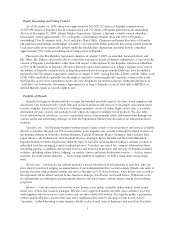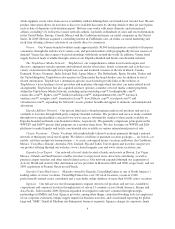Expedia 2009 Annual Report Download - page 19
Download and view the complete annual report
Please find page 19 of the 2009 Expedia annual report below. You can navigate through the pages in the report by either clicking on the pages listed below, or by using the keyword search tool below to find specific information within the annual report.maintain or enhance consumer awareness of our brands, and, even if we are successful in our branding efforts,
such efforts may not be cost-effective, or as cost-effective as they have been historically. If we are unable to
maintain or enhance consumer awareness of our brands and generate demand in a cost-effective manner, it would
have a material adverse effect on our business and financial performance.
Our business could be negatively affected by changes in search engine algorithms and dynamics, or
search engine disintermediation.
We increasingly utilize internet search engines such as Google, principally through the purchase of travel-
related keywords, to generate traffic to our websites. Search engines, including Google, frequently update and
change the logic that determines the placement and display of results of a user’s search, such that the purchased
or algorithmic placement of links to our websites can be negatively affected. In addition, a significant amount of
traffic is directed to our websites through our participation in pay-per-click and display advertising campaigns on
internet media properties and search engines whose pricing and operating dynamics can experience rapid change,
both technically and competitively. If a major search engine changes its algorithms in a manner that negatively
affects the search engine ranking, paid or unpaid, of our websites or that of our third-party distribution partners,
or if competitive dynamics further impact market pricing in a negative manner, our business and financial
performance would be adversely affected. In addition, to the extent Google, Bing and other leading search
engines attempt to more directly appeal to travel consumers by maintaining transactions within their own
websites or referring those leads to suppliers directly, that could have a meaningfully adverse impact on our
business and financial performance.
We rely on information technology to operate our businesses and maintain our competitiveness, and
any failure to adapt to technological developments or industry trends could harm our business.
We depend on the use of sophisticated information technologies and systems, including technology and
systems used for reservations, communications, procurement and administration. As our operations grow in both
size and scope, we must continuously improve and upgrade our systems and infrastructure to offer an increasing
number of travelers enhanced products, services, features and functionality, while maintaining the reliability and
integrity of our systems and infrastructure. Our future success also depends on our ability to adapt our services
and infrastructure to meet rapidly evolving consumer trends and demands while continuing to improve the
performance, features and reliability of our service in response to competitive service and product offerings. New
developments in areas, such as cloud computing, could also make it easier for competition to enter our markets
due to lower up-front technology costs.
In addition, we may not be able to maintain our existing systems or replace or introduce new technologies
and systems as quickly as we would like or in a cost-effective manner. We have been engaged in a multi-year
effort, which we expect to continue for several years, to migrate portions of our site functionality to new
technology platforms to enable us to introduce innovation more rapidly, achieve better search engine
optimization and improve our site merchandising capabilities, among other anticipated benefits. These migrations
have been more time consuming and expensive than originally anticipated, and the resources devoted to those
efforts have adversely affected our ability to develop new site innovations. Continued delays or difficulties in
implementing new or enhanced systems may keep us from achieving the desired results in a timely manner, to
the extent anticipated, or at all. In addition, during the migration process the sites may experience reduced
functionality and decreases in conversion rates. Also, we may be unable to devote financial resources to new
technologies and systems in the future. If any of these events occur, our business and financial performance
could suffer.
We rely on third-parties for many systems and services.
We rely on third-party service providers for certain customer care, fulfillment, processing, systems
development, technology and other services. If these third-parties experience difficulty meeting our requirements
or standards, it could damage our reputation or make it difficult for us to operate some aspects of our business. In
addition, if such third-party service providers were to cease operations, temporarily or permanently, face
financial distress or other business disruption, we could suffer increased costs and delays in our ability to provide
similar services until an equivalent service provider could be found or we could develop replacement technology
or operations. In addition, we rely increasingly on outsourced providers of traveler care and information
13
























